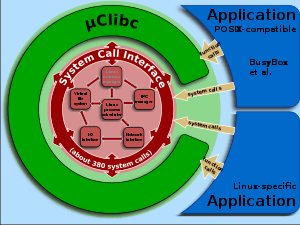μClinux
μClinux is a variation of the Linux kernel, previously maintained as a fork, that targets microcontrollers without a memory management unit (MMU).[1] It was integrated into the mainline of development as of 2.5.46;[2] the project continues to develop patches and tools for microcontrollers. The homepage lists Linux kernel releases for 2.0, 2.4 and 2.6 (all of which are end-of-life in mainline).
 An iPod booting iPodLinux, based on μClinux | |
| OS family | Embedded Linux |
|---|---|
| Working state | Current |
| Source model | Open source |
| Platforms | See below |
| Kernel type | Linux kernel-fork |
| Userland | uClinux-dist, uClibc, BusyBox |
| Official website | uclinux.org at the Wayback Machine (archived 2018-11-13) |

The letters "μC" are for "microcontroller": the name is pronounced "you-see-Linux", rather than pronouncing the letter mu as in Greek.[3]
History
μClinux was originally created by D. Jeff Dionne and Kenneth Albanowski in 1998. Initially, they targeted the Motorola DragonBall family of embedded 68k processors (specifically the 68EZ328 series used in the Motorola PalmPilot) on a 2.0.33 Linux kernel. After releasing their initial work, a developer community quickly sprang up extending their work to newer kernels and other microprocessor architectures. In early 1999, support was added for the Motorola (now Freescale) ColdFire family of embedded microprocessors. ARM processor support was added later.
Although originally targeting 2.0 series Linux kernels, it now has ports based on Linux 2.4 and Linux 2.6. The Linux 2.4 ports were forward ported from the 2.0.36 Linux kernel by Michael Leslie and Evan Stawnyczy during their work at Rt-Control. There were never any μClinux extensions applied to the 2.2 series kernels.
Since version 2.5.46 of the Linux kernel, the major parts of μClinux have been integrated with the mainline kernel for a number of processor architectures.[4]
Greg Ungerer (who originally ported μClinux to the Motorola ColdFire family of processors) continued to maintain and actively push core μClinux support into the 2.6 series Linux kernels. In this regard, μClinux is essentially no longer a separate fork of Linux.
μClinux had support for many architectures, and forms the basis of many products, like network routers, security cameras, DVD or MP3 players, VoIP phone or gateways, scanners, and card readers.
Support for several of the original target architectures was dropped in 2018.[5] The obsolete CPU architectures set to be removed in Linux 4.17 and subsequent releases included ADI Blackfin, Etrax CRIS, Fujitsu FR-V, Mitsubishi M32R, Matsushita/Panasonic MN10300, Imagination META (Metag), and Tilera TILE.[6]
Supported architectures
The current list includes:
- Altera Nios/Nios II
- Amber (open FPGA core)
- ARM ARM7TDMI, ARM Cortex-M3/M4/M7,[7] ARM Cortex-R
- Lattice Mico32
- NXP 680x0 (Motorola/Freescale 680x0)
- Hitachi H8
- Hyperstone E1/E2 (called hyLinux)
- Intel i960
- MIPS
- NXP ColdFire (Motorola/Freescale ColdFire)
- NEC V850E
- Xilinx MicroBlaze
No longer supported
Before Linux 4.17 the following architectures were also supported[8]:
References
- D. Jeff Dionne; Michael Durrant. "uClinux Description". Archived from the original on 2007-12-25. Retrieved 2007-12-31.
- Greg Ungerer. "uClinux mainline Announcement". Archived from the original on 2007-10-31. Retrieved 2008-01-15.
- "μClinux". Archived from the original on October 4, 2006. Retrieved August 31, 2015.
- Miles Gillham "uClinux and Linux set to merge", Linux.com, November 19, 2002.
- Linus Torvalds "Linux 4.17-rc1", LKML.ORG, 15 April 2018.
- Jonathan Corbet "Shedding old architectures and compilers in the kernel", LWN.net, February 26, 2018.
- "Linux for ARM® Processors www.arm.com Summer/Winter 2013 Robert Boys bob.boys@arm.com System Design Division, ARM" (PDF). 2013-09-10. Retrieved 2014-07-17.
What about Cortex-M and Cortex-R ? /../ These can run a modified version of Linux called uClinux.
- "[GIT PULL] arch: remove obsolete architecture ports".
External links
- Official website at the Wayback Machine (archived 2018-11-13)
- μClinux-dist, complete source distribution package at the Wayback Machine (archived 2018-11-13)
- μClinux at SourceForge
- μClinux - Setting up the Development Environment at the Wayback Machine (archived 2017-03-24)
- Accelerated-Linux, an actively developed continuation of μClinux-dist